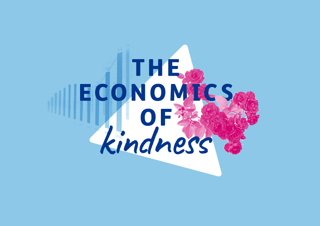
Being kind is usually defined as behaving in a generous, helpful way towards others; being considerate of, and showing concern for them; and all without expecting anything in return. We may experience mutual, reciprocated kindness from others over time, but that expectation isn’t in our minds when we are kind to them.
This article is part of our series on the Economics of Kindness.
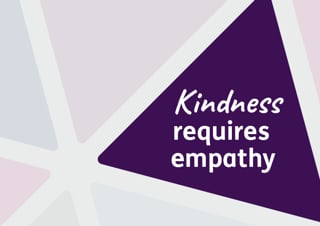
Unpacking what this requires in a leadership setting, we usually land on several components. The first is empathy – i.e. the ability to put yourself in the shoes of the other person and think through how they might view a situation, or what they would like to do, given their personal motivations, ambitions and mental models.
But another very helpful attribute leaders should have, if they are to be consistently kind to people, is a relatively low ego. Being someone who can regularly set aside their own ego – for the benefit of the other person, of the situation, or of the client – is often what enables kindness.
Equally, if you are the person who always has to be right, or get their own way, or dominate the conversation and demonstrate how much you know, then kindness will often elude you. You just won’t see the opportunities for being kind, because you’re too busy being seen to be right.
"Being someone who can regularly set aside their own ego is often what enables kindness."
The two big wins of low-ego leadership
And this is where we start to understand the two big wins that low-ego leadership can bring = for the people in their teams, for their organisations and for these leaders themselves. The first is that they put the work ahead of their ego: they care more about getting to the right answer than in being the one who came up with it. This opens up a tonne of opportunity for collaboration and genuine innovation – because other people are more likely to work with you and more likely to share their best ideas with you when you behave like that.
The second big benefit of leading in this way is that you will build far greater capability in your teams, because you are genuinely interested in how much the people in your team are learning. That motivates you to develop them as experts in their own right – because you don’t feel the need to always have the answer, or to be what Liz Wiseman has termed, the ‘know-it-all’ leader.1
So, if low-ego leadership is such a good idea, why don’t we hear more about it? Well, I think we’re starting to. David Rock, Brene Brown and Adam Grant all write regularly about the benefits of what Rock has called “quiet leadership”.2 And in the leadership literature, my esteemed former MIT colleague, the late Ed Schein, has noted the importance of humility in being able to keep an open mind and properly engage in conversations that get to the bottom of an issue or an idea.3
The Hollywood leader
Nevertheless, this still isn’t the sort of leadership that grabs the newspaper headlines, or features in your typical Netflix series. The type of leadership that these vehicles continue to peddle is what I have called the ‘Hollywood’ version of leadership4 – where leaders are charismatic (no bad thing in and of itself) but also self-centred. They need to be the hero in the story and, as a result, they don’t leave enough room for others to shine.
And what my research shows is that, while this ‘Hollywood’, high-ego version of leadership may deliver some short-term gains in an organisation’s fortunes, it isn’t what’s needed to deliver sustained, long-term change. That requires leaders who listen and learn – including to negative feedback on their own leadership; and who believe that value comes from doing the right things, and often making tough calls, over the long term.
"High-ego leadership isn’t what’s needed to deliver sustained, long-term change."
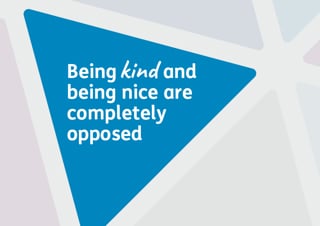
The role of kindnesss in effective leadership
And that brings us to a final but critical point about kindness and the link to low-ego leadership. Making tough calls, and being prepared to explain them, sell them and evangelise for them, is often what marks the best leaders out from the rest. Doing that in a way that shows empathy for the individuals impacted by those tough calls is essential. But “kindness” ought not to be used as an excuse for failing to make these tough calls in the first place. Some people assume that kindness just means being “nice”. But actually being kind and being nice are frequently very different – in fact, sometimes, they are completely opposed.
For example, if you think you’re being “kind” when you delay giving someone the negative feedback they need to help them improve their performance, you’re fundamentally misunderstanding what kindness is. You’re not actually thinking about what’s in that person’s long-term best interests. Or, for that matter, in the interest of their colleagues or direct reports – all of whom might be suffering because of this person’s performance.
So, the next time you’re tempted to put off a ‘difficult’ conversation and you try to use being “kind” as the excuse, here’s what I suggest you do:
- First, think about what this person really needs to hear from you in order to improve their performance, or behaviour, and thereby stand the best chance of succeeding in their career. Having that conversation with them is pretty close to the definition of being kind. Equally, avoiding that conversation is pretty close to the definition of selfishness. In fact, it’s actually cruel to delay giving them the information they need in order to improve.
- Second, think beyond this individual to the rest of the team and the collateral damage that their current level of performance is causing their clients, colleagues or direct reports. The status quo isn’t cost-free and when you take a wider view of the impact, you’ll see the true cost of not having the conversation – and how unkind you’re being to all of the people currently living with those costs.
- Finally, project ahead. Think about where this person might be in, say, ten years’ time if (a) you have the conversation and they act on your feedback; and (b) if you chicken out and they never learn what they need to do differently. What’s the gap in their cumulative achievement? And what would they say to you in a decade’s time if they realise that they didn’t achieve their ambitions because you failed to give them the help they needed right now.
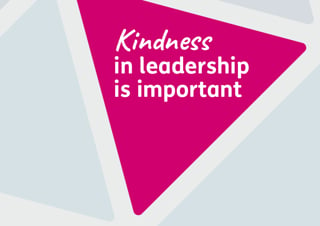
That kindness is important for effective leadership is still something on which we have a paucity of longitudinal research: we can’t say that it delivers more value than being unkind per se.
But in the ways that I’ve talked about – whether it’s by being a more low-ego leader who brings others’ ideas to the fore, or by making sure we help people course-correct when they need to – we can make the intuitive case that being kind is a better way to lead our teams and our organisations.
It would certainly be my default setting – in other words, the place to start and the de facto mind-set to adopt. That’s the advice I give to all the leaders whom I advise, and I think they are more effective, and personally happier, for trying to be that kind of leader.
References
1. Wiseman, 2010, “Multipliers: How the Best Leaders Make Everyone Smarter”, Harper Business
2. Rock, 2007, “Quiet Leadership”, Harper
3. Schein, 2013, “Humble Inquiry”, Berrett-Koehler Publishers
4. Johnson, 2020, “Step Up, Step Back”, Bloomsbury Business
"Being kind is a better way to lead our teams and our organisations."
About the author
Dr Elsbeth Johnson is a Senior Lecturer at the MIT Sloan School of Management and an expert on leadership, strategy and change. Her career spans roles as an equity analyst and corporate strategist with experience teaching in some of the world’s premier business schools (London Business School, the LSE and MIT Sloan). As an advisor and facilitator, she consults with boards and other senior leadership groups, introducing concepts and frameworks, leading discussions, surfacing issues and facilitating change. She has worked with a range of organisations, including American Express, ARM, Baringa, Citibank, Deutsche Bank, Google, HSBC, Linklaters, Merck, The Moonpig Group, QBE and Swiss Re.
Meet our expert

Anya Davis
Anya Davis supports corporates and investors with their transition to a low-carbon world. Anya has 15+ years’ experience in the energy sector. She has helped established players transform, and new entrants invest and build businesses in this market. She has extensive experience across the investment lifecycle and value creation. She is also responsible for ensuring the Baringa culture evolves to continue to be a great place to work.
Learn moreRelated Insights
Trending content in this series
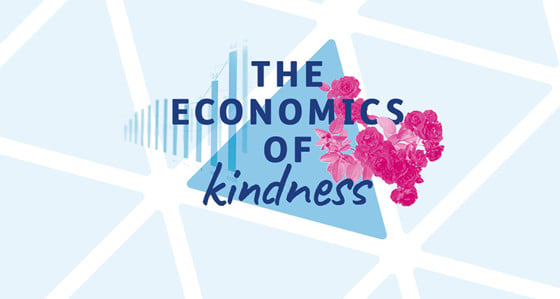
Introducing the Economics of Kindness
At Baringa we’re convinced that, no matter the macroeconomic backdrop, kindness in business really does pay. That’s why we’re taking this opportunity to explore the economics of kindness across four pillars: people, business, leadership and investors.
Read more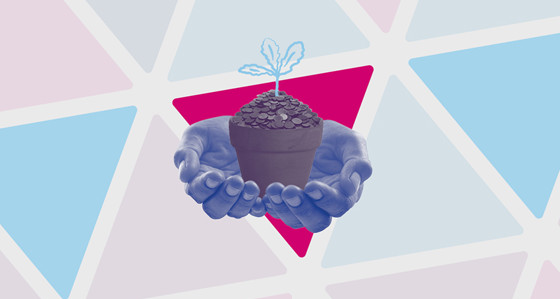
People – planet – profit, in that order
The notion of a ‘triple’ bottom line – people first, then planet, then profit – is reshaping how organisations around the world do business. They’re bringing corporate kindness to the fore as we enter a new type of economy, and the businesses that organise themselves in this way will be the ones that succeed.
Read more
Redefining kindness in the workplace
Corporate kindness is all about the impact an organisation has on the world, engaging in responsible practices that benefit their customers, employees, and the communities they operate in.
Read more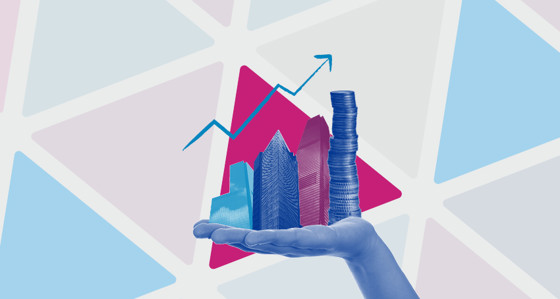
Bringing kindness back to the top of the leadership agenda
Should kindness be back at the top of the leadership agenda? Managing Partner Adrian Bettridge discusses how when we lead with kindness, we generate lasting success for ourselves, our clients and our businesses.
Read more
It’s not easy to be a kind leader
Can leaders be kind all of the time? What gets in the way? Ian Peters reflects on the challenges and trade-offs of trying to be kind to all stakeholders.
Read more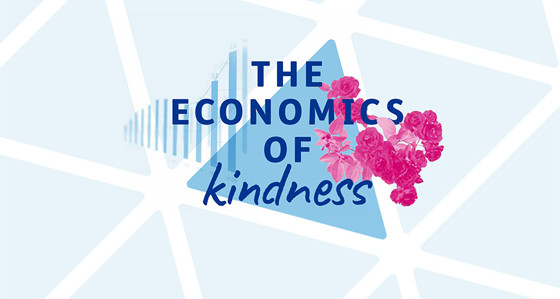
Our Economics of Kindness journey: the story so far
What have we learned about kindness in business and in our public organisations? Does it pay? And if so, how?
Read more